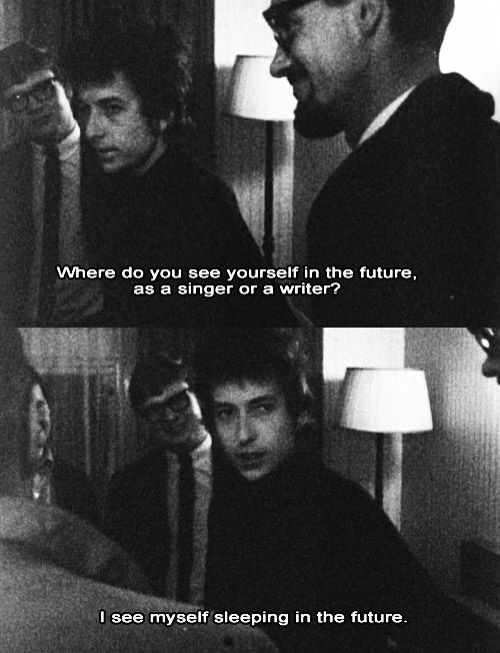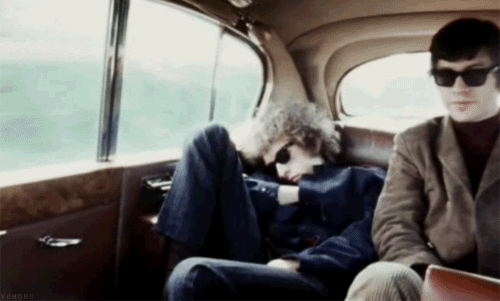- “Bob Dylan’s Dream”, The Freewheelin’ Bob Dylan
- “Talkin’ World War III Blues”, The Freewheelin’ Bob Dylan
- “Bob Dylan’s 115th Dream”, Bringing It All Back Home
- “I Dreamed I Saw St. Augustine”, John Wesley Harding
- “When You Gonna Wake Up”, Slow Train Coming
- “Had A Dream About You, Baby”, Down In The Groove
- “Series Of Dreams”, The Bootleg Series, Vol 1-3
- “Dreamin’ Of You”, The Bootleg Series, Vol 8
- “This Dream Of You”, Together Through Life
- “‘Cross The Green Mountain”, The Bootleg Series, Vol 8
This is an album suggested by silverwheel, and I suspect it’s a ridiculously circuitous plan to get me to talk about his favourite Bob Dylan song ever, tucked away at the end there. But choosing the songs based on a single theme does open up some interpretive lenses to see him through; on the broadest level, it makes me realise that despite being surrealist and occasionally nonsensical, Dylan’s lyrics can’t really be described as ‘dreamlike’ the way, like, Pink Floyd songs read as dreamlike to me (or, moving out of music, David Lynch films and Philip K Dick books). I’ve decided the reason I like the version of “Visions of Johanna” that Narrator showed me so much is because it sounds how being lost in thought feels to me, like only being able to hold onto one thought as a million others flow within you and the world flows without you; it’s a process that sounds random and is often presented as random (stream-of-consciousness being presented that way), but to me is more of a purposeful circling, like holding an idea in one hand and using the other to sift through everything else you know. Dreams, on the other hand, mean sifting through your brain with both hands. As always, when Dylan is dreaming, it’s another pose he’s striking.
The second thing I ever remember reading about Bob Dylan was that he’d written the lyric “Ah, but I was so much older then, I’m younger than that now”, and that this signified his becoming less cynical; I notice that his earliest songs are written as if he were an old man looking back on a lifetime of experiences, with “Bob Dylan’s Dream” wistfully looking back on a time that’s vanished and will never come back. I wonder if this partially contributed to his initial success, with an audience of young people who totally distrusted the older establishment but were instinctively looking for an authority figure, and a young man who talked with the authority of an old man fit the bill. Looking at this from the lens of it being a kind of dream, this is a dream as a resurfacing memory.
(The first thing I ever remember reading about Bob Dylan was that, when asked by a reporter “What’s your message?”, he angrily responded “What’s my message?!”, brandished a lightbulb, and declared, “Keep a cool head and always carry a lightbulb!”)
“Talkin’ World War III Blues”, on the other hand, presents a dream as an underlying emotion that bubbles to the surface, in this case fear of nuclear war, and I really like how it implies a collective link between all people that only emerges in our dreams. I’ve been rereading Uncommon People: The Rise And Fall Of The Rock Stars 1955-1994 by David Hepworth, and he characterises Bob Dylan as a man who invented himself, sucking up information from everyone and everything around him, creating a character, and living how he thought that character would live. Perhaps, to completely backflip on what I just said, he was young enough in 1963 that he was a relative blank slate, completely free of personal experiences and feelings weighing him down and effectively making him a perfect mirror to the world, giving it back its nuclear anxiety. Perhaps when he made a bold declaration of identity and went electric, he severed that connection to all people permanently and truly became Bob Dylan.
But to backflip again, this song also exemplifies something specific to Dylan: his weird sense of humour. He shares with Tarantino and The Shield an ability to be really funny without actually fitting under the label ‘comedy’, and this is his funniest that I’ve gotten to so far – “I didn’t see you around” got a chuckle out of me. His ability to make strange, yet appropriate connections between things extends to jokes he tells, where I feel like he’s making a reference to something that makes sense in his head and I just barely feel that connection enough to find it absurd.
“Bob Dylan’s 115th Dream” is the one song in the album that hits the most common interpretation of what a dream is: a surreal stream-of-consciousness brain fart that just throws up random imagery in some combination. I found myself thinking of “Changing Of The Guard”, because this song also has no singular refrain; “115th Dream” has several advantages. First, it has a central protagonist that gives the song a centre of gravity, turning it into the strangest road trip. Secondly, it has a rock and roll no-fucks-given energy that makes it sound half the length of “Guard” despite being almost exactly the same time. I was so excited when it ended with the phrase ‘good luck’ and so disappointed when I found no connection to his quip that all his songs end that way aside from that particular press conference happening the year he wrote the song.
“I Dreamed I Saw St. Augustine” strikes me as a dream that’s a vision from another plane of existence; perhaps Dylan sees the spiritual history of everything, and he sees ghosts of people and places and organisations sitting back and commenting on what’s happening now. “When You Gonna Wake Up” is from Dylan’s born-again phase, and it’s almost depressing that he went with the old cliche of dreaming being a metaphor for ignoring how the world is; he’s smarter than that. “Had A Dream About You, Baby” has the most interesting use of a dream; just like “Talkin’ World War III Blues”, it presents a dream as a feeling bubbling up, and this song uses that to flatter someone, as if they were worth dreaming about.
Musically speaking, “Series Of Dreams” is totally boss; most of Dylan’s songs are simple repetition of a a single chord progression, but few draw as much attention to their repetition as this; it’s a weird mix of upbeat, panicked, sad, and driving, good for a driving album. It’s weirdly of a piece with the lyrics, which are the ones on the album that actually considers the nature of dreams the way I am here. “Dreamin’ Of You” is equally boss, a smokey bar of a song, another one where I feel like Dylan is spilling his guts to me in a bar somewhere. The thing is, he’s at the opposite end of life than he was on Freewheelin’ Bob Dylan, weighed down by a lifetime of personal experiences, and I feel like I’m missing a lot of context for what he’s saying. A lot of parents (including, if I remember correctly, beloved commentor The Ploughman) have commented that Star Wars: The Force Awakens hits a lot harder for them than for me because the simple presentation of a parent and a child lets them fill in the gaps in the story. Dylan is making allusions to things that haven’t happened to me yet.
“This Dream Of You” is the first time I’ve had that reaction that wallflower described as “Is he serious? Yes, he’s serious.” I’m generally open to silliness and total commitment to silliness, and apparently that extends exactly as far as a rock star playing polka; it took me about half the song to realise he was playing polka because he genuinely liked it and settling into its groove properly. Lyrically, it feels like a sequel to “Visions Of Johanna”, in which the protagonist’s love for someone in particular keep him centred, but with a lifetime of experience to draw on. Which brings me to “‘Cross The Green Mountain”.
I’m looking forward to silverwheel’s comment on this article, because I’m sorry to say it goes over my head completely. Like, I grasp it as a serious version of “Beautiful Ride” from Walk Hard: The Dewey Cox story, but the emotions don’t hit at all. I don’t think this is the song’s fault or Dylan’s fault or my fault, just something that happened. It’s strange, actually; I notice young guys tend to be drawn to wizened old guys (look up the comments to Frank Sinatra’s “It Was A Very Good Year” on Youtube), and I’m as susceptible to that as anyone, so I don’t know why it’s not working here. Perhaps it’s that the lyrics aren’t universal, and so they don’t flatter my preconceptions that my experiences make me smart.

Next: “God, The Devil, And Bob”, Bob Dylan’s religious songs from outside his born-again period, based on a suggestion from wallflower.

